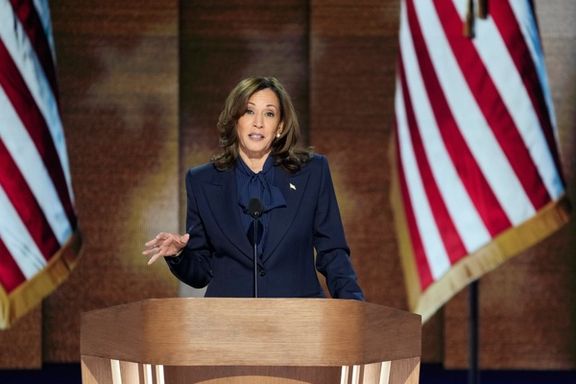"I will never hesitate to take whatever action is necessary to defend our forces and our interests against Iran and Iran-backed terrorists," Harris declared, in the toughest statement yet since she emerged as a replacement to President Joe Biden for November.
Formally accepting her party’s nomination Thursday night, Harris said, "In the enduring struggle between democracy and tyranny, I know where I stand and I know where the United States belongs," Harris said, accusing Trump of bowing down to dictators.
Government-controlled media in Tehran dubbed Harris's speech "anti-Iran," slightly twisting her words, claiming that the Democratic candidate threatened the Islamic Republic.
However, many foreign policy observers have been warning on social media that if she wins in November, the Harris administration will continue Biden’s relatively “soft” approach toward the Islamic Republic of Iran.
Former President Donald Trump was known for his hardline stance against Tehran, implementing crippling oil export and other sanctions that remain in effect today. However, under President Biden, enforcement of these sanctions has softened, allowing Tehran to significantly boost its oil exports and revenues.
One Iranian opposition figure in the United States tweeted after Harris’s speech, “The Harris-Biden administration had over three and a half years to take a tough stance against the Islamic regime in Iran. Instead, by abandoning Donald Trump's maximum pressure policy and failing to enforce sanctions,” they allowed Tehran to sell more oil. He added that the White House also released $16 billion in frozen funds for Iran in 2023.
As Harris prepared to deliver her speech at the Democratic convention, five Republican senators sent a letter to President Joe Biden, urging the White House to deny visas to several foreign leaders, including Iran’s new president, Masoud Pezeshkian, ahead of the UN General Assembly in New York this September.
The letter signed by Senators Marco Rubio, Joni Ernst, Rick Scott, Markwayne Mullin and Tom Cotton, called Pezeshkain and Cuban dictator Miguel Díaz-Canel, and “the narcodictator of Venezuela,” Nicolas Maduro Cuban dictator, V “raises serious security issues for the United States and our allies.”
The letter said, “Iran is directly responsible for the horrific October 7th attack on Israel and the recent rocket strikes that killed a dozen innocent Israelis, including children, at a soccer field in the Golan Heights.”
The senators maintained that although the United Nations General Assembly is a diplomatic forum, the US should take a stand against foreign leaders “who threaten our values.”
“President Ronald Reagan denied a visa to Yasser Arafat in 1988 due to his support for state-sponsored terrorism, and President Trump similarly denied a visa to Iranian Foreign Minister Mohammad Javad Zarif. In this spirit, we urge you to deny entry visas to dictators Pezeshkian, Díaz-Canel, Maduro and any other leaders whose presence at the UN General Assembly would undermine our national security,” the Republicans lawmakers stated.







